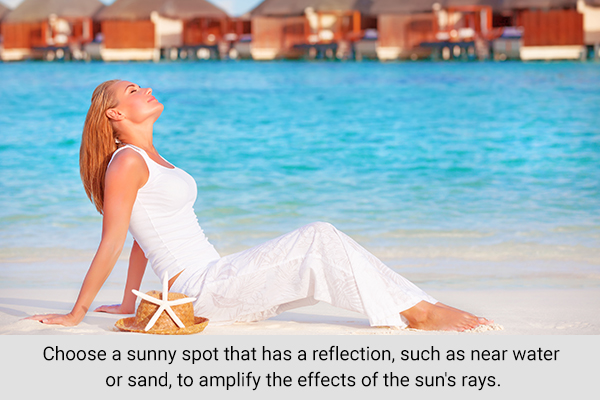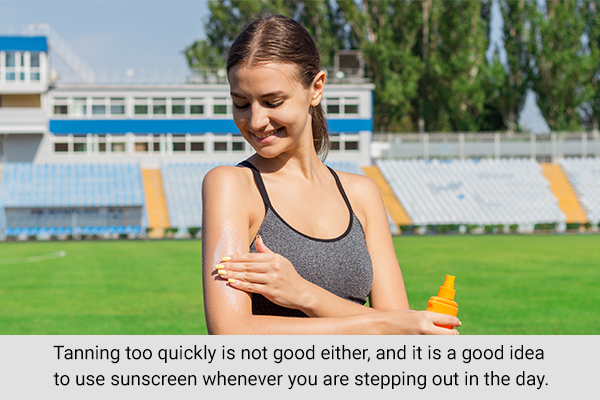In this article:
If you’ve ever been in the sun for more than a few minutes, you’ve probably noticed that your skin turns a little bit brown. This is because your body is producing melanin, a pigment that helps protect your skin from the harmful effects of UV radiation.

When your skin is exposed to UV radiation, it triggers the release of melanin. The melanin then travels up to the surface of your skin, where it absorbs UV radiation and protects the lower layers of your skin from damage. (1)
So why am I not tanning? There could be a few reasons. Maybe I’m not spending enough time in the sun. Or maybe I’m on medication, which prevents my skin from developing a tan. (2) Whatever the reason, there are ways to get around it and get your tan on!
This article will cover the reasons why someone might not be tanning and how to get that healthy, sun-kissed glow, what are the causes for not tanning and how can you get back on track with your tanning routine.
Reasons You’re Not Tanning
Here are some reasons you are not getting that natural-looking bronze glow.
There are many reasons why someone might not tan, even if they spend time in the sun. Some of the reasons can be:
- Some skin types are more resistant to tanning than others. People with fairer skin and people of different races can show variations in getting and keeping a tan. (1)
- There are also medical conditions that can make it difficult to tan. Albinism is one example of a condition that can prevent someone from getting a tan. People with albinism have very little melanin in their skin, which is what gives skin its color. Without melanin, the skin cannot absorb sunlight and produce a tan. (2)
- There are also certain medications that can make it difficult to tan. Medications that increase sensitivity to sunlight or suppress the immune system can make it hard to get a tan or may cause the person to burn more easily. (2)
- One reason could be that the person is not spending enough time in the sun.
- Another possibility is that the person is using sunscreen with a high SPF, which blocks out the UV rays that cause tanning.
- It could also be that the person has a skin type that does not tan easily.
- Genetic factors also play a role in tanning between Asian, European and African populations, which affect the synthesis of melanin (the substance responsible for tanning) or its expression. (1)(3)
How to Get a Tan

Here are a few things that can help make the process of getting a tan easy and effective:
- Use sunscreen with an SPF of 15 or higher to protect your skin from burning.
- Exfoliate your skin before sun exposure to remove dead skin cells and allow the new ones to better absorb UV light.
- Choose a sunny spot that has a reflection, such as near water or sand, to amplify the effects of the sun’s rays. (4)
- You may need to spend more time in the sun to get the same effect as those who do tan. It is important to start slowly and increase sun exposure gradually so that the skin can adjust and avoid burning.
Most-Asked Questions About Tanning
I have tried multiple tanning methods but cannot seem to maintain a tan for a long time. What do I do?
Different tanning methods have different durations of effectiveness, and it depends on several factors such as your skin tone and genetics.
Consult with a dermatologist to understand your skin type and needs so they can formulate an effective treatment for you.
I tan too easily. What can I do to get a gradual tan?

If you are taking any medications currently, they could be causing you to be more prone to tanning. Tanning too quickly is not good either, and it is a good idea to use sunscreen whenever you are stepping out in the day.
If the excessive tan is sudden or unusual in any way, book an appointment with your dermatologist as soon as possible to rule out any health issues.
Final Word
There are many reasons why you might not be tanning, ranging from medical conditions to simple lifestyle choices.
If you’re concerned about why you’re not tanning, it’s best to speak with a dermatologist or other medical professionals to rule out any health issues. It is good to take professional advice regarding the safest tanning methods and alternatives available to you. (5)
Once you know that there’s nothing medically preventing you from tanning, consider whether your diet, clothing choices, or sun exposure habits could be affecting your ability to develop a tan. With a little effort, you should be able to find the root cause of your problem and get on the path to a perfect summer tan.
- Was this article helpful?
- YES, THANKS!NOT REALLY


